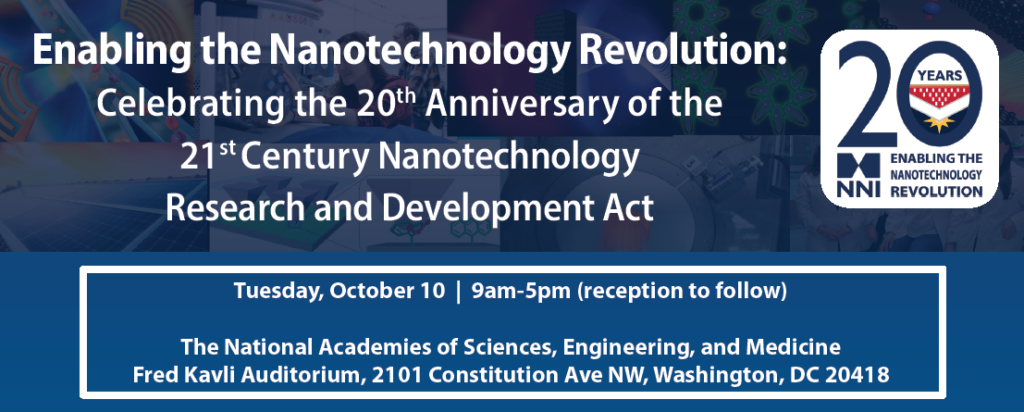It’s the 20th anniversary of the US National Nanotechnology Initiative (NNI) and, now, scientists and policymakers will be celebrating and analyzing the results on October 10, 2023 according to a September 18, 2023 post on the JD Supra Nano and Other Emerging Chemical Technologies blog, Note: A link has been removed,
On October 10, 2023, the National Nanotechnology Coordination Office (NNCO) will host a symposium entitled “Enabling the Nanotechnology Revolution: Celebrating the 20th Anniversary of the 21st Century Nanotechnology Research and Development Act” at the National Academies of Sciences, Engineering, and Medicine. Experts will address the importance of nanotechnology in microelectronics, optics, advanced polymers, quantum engineering, medicine, education, manufacturing, and more. Discussions will also focus on the environmental, health, and safety implications of nanomaterials, as well as the National Nanotechnology Initiative (NNI) community’s efforts around inclusion, diversity, equity, and access.
You can register and find more information on the National Nanotechnology Initiative (NNI) anniversary symposium webpage, Note: A link has been removed,

Scientists and engineers across many fields and disciplines are united by their work at the nanoscale. Their diverse efforts have helped produce everything from faster microchips to powerful mRNA vaccines. The transformative impact of this work has been spurred by the coordination and focus on U.S. nanotechnology established by the 21st Century Nanotechnology Research and Development Act in 2003. Celebrating such a broad impact and envisioning the future can be quite challenging, but this event will bring together voices from across the emerging technology landscape. There will be experts who can speak on the importance of nanotechnology in quantum engineering, optics, EHS, plastics, DEIA, microelectronics, medicine, education, manufacturing, and more. We can’t predict what will emerge from this lively discussion between researchers, policymakers, members of industry, educators, and the public, but the conversation can only benefit from including more diverse perspectives – especially yours.
You have the option of registering in-person attendance or for virtual attendance.
Here’s the:
AGENDA
9:00-9:05 Welcome and Introduction
9:05-9:30 Opening Remarks on the NNI
9:30-10:15 Morning Keynote
10:15-10:30 Coffee Break
10:30-11:15 Panel: Responsible Development
11:15-12:00 Panel: Fundamental Research
12:00-1:00 Lunch and Networking
1:00-1:45 Keynote Panel: The Future of Nanotechnology
1:45-2:30 Panel: Workforce Development
2:30-2:45 Break
2:45-3:30 Panel: Infrastructure
3:30-4:15 Panel: Commercialization
4:15-5:00 Closing Keynote
Reception to follow
If you’re curious about the panelists and speakers, you will find a list with pictures and links to profile pages on the NNI’s anniversary symposium webpage.